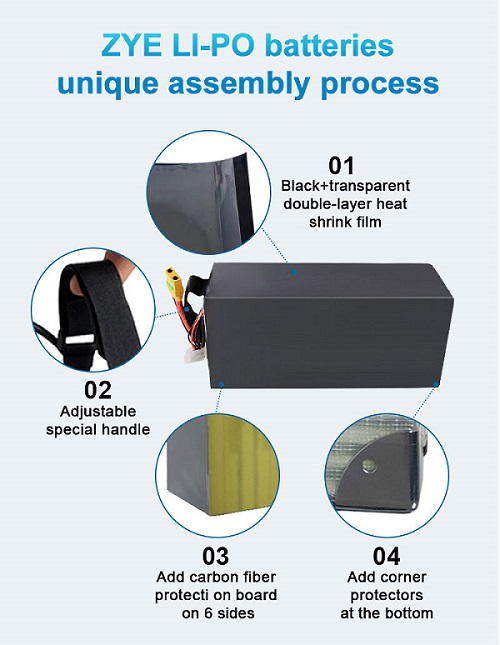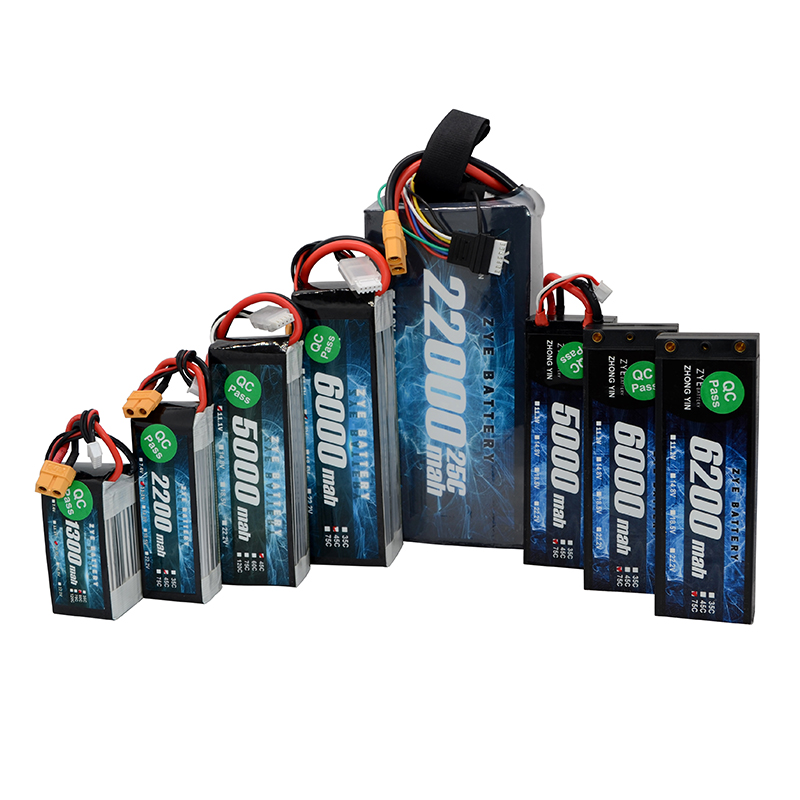How to store lipo batteries?
2025-03-04
Proper storage of LiPo (Lithium Polymer) batteries is crucial for maintaining their performance, longevity, and safety. Whether you're a hobbyist, professional, or simply someone who uses devices powered by LiPo batteries, understanding how to store them correctly is essential. In this comprehensive guide, we'll explore the best practices for storing LiPo batteries, with a particular focus on high-capacity batteries like the 22000mah 14s lipo battery.
Proper Storage Tips for Your 22000mah 14s Lipo Battery
When it comes to storing a 22000mah 14s lipo battery, following these tips will help ensure its longevity and safety:
1. Charge Level
One of the most critical aspects of LiPo battery storage is maintaining the proper charge level. For long-term storage, it's recommended to keep your battery at around 50% to 60% of its full charge. This voltage range helps prevent cell degradation and maintains the battery's overall health.
For a 22000mah 14s lipo battery, this means aiming for a voltage of approximately 3.8V per cell. Most modern LiPo chargers have a "storage mode" feature that automatically brings the battery to this optimal storage voltage.
2. Temperature Control
LiPo batteries are sensitive to temperature extremes. Store your battery in a cool, dry place with a temperature range between 40°F and 70°F (4°C to 21°C). Avoid exposing the battery to direct sunlight or placing it near heat sources. Extreme heat can cause the battery to swell, while cold temperatures can reduce its performance.
3. Use a LiPo Safe Bag
Invest in a high-quality LiPo safe bag or fireproof container for storing your 22000mah 14s lipo battery. These specially designed containers provide an extra layer of protection in case of battery failure or fire. While such incidents are rare, it's always better to err on the side of caution.
4. Regular Inspections
Even during storage, it's important to periodically inspect your LiPo battery. Check for any signs of swelling, damage to the outer casing, or leakage. If you notice any of these issues, dispose of the battery safely and replace it with a new one.
5. Avoid Moisture
Keep your LiPo battery away from moisture and humidity. Exposure to water can damage the battery's internal components and potentially lead to short circuits. Store your battery in a dry environment, and consider using silica gel packets to absorb any excess moisture.

Why Safe Storage is Crucial for Your Lipo Battery's Lifespan
Understanding the importance of proper storage for your 22000mah 14s lipo battery can help you maximize its lifespan and maintain optimal performance. Here's why safe storage matters:
Prevents Internal Chemical Degradation:
LiPo batteries undergo continuous chemical reactions, even when not in use. Storing them at the correct voltage slows down these reactions, preventing premature aging and capacity loss. This is particularly important for high-capacity batteries like the 22000mah 14s lipo, where maintaining cell balance is crucial.
Maintains Cell Balance:
In a multi-cell battery like the 14s configuration, keeping the cells balanced is vital. Proper storage helps maintain this balance, ensuring that all cells degrade at a similar rate. This balance is essential for the battery's overall performance and safety.
Reduces Risk of Swelling:
LiPo batteries are prone to swelling when overcharged or stored at full charge for extended periods. Swollen batteries are dangerous and should not be used. By storing your battery at the recommended voltage, you significantly reduce the risk of swelling.
Enhances Safety:
Proper storage techniques not only extend the life of your battery but also enhance safety. LiPo batteries, especially high-capacity ones, can be potentially hazardous if mishandled. Following correct storage procedures minimizes the risk of accidents.
Preserves Capacity:
Over time, all batteries lose some of their capacity. However, proper storage can significantly slow down this process. By following the right storage practices, you can help your 22000mah 14s lipo battery maintain its capacity for a longer period, ensuring better performance when you need it.
Common Mistakes to Avoid When Storing 22000mah 14s Lipo Batteries
Even with the best intentions, it's easy to make mistakes when storing LiPo batteries. Here are some common pitfalls to avoid:
Storing at Full Charge
One of the most common mistakes is storing LiPo batteries at full charge. This puts unnecessary stress on the cells and can lead to premature aging and swelling. Always discharge your battery to the recommended storage voltage before putting it away for an extended period.
Ignoring Temperature
Storing LiPo batteries in areas with extreme temperatures, such as a hot garage or a cold basement, can significantly impact their performance and lifespan. Always choose a location with a stable, moderate temperature for battery storage.
Neglecting Regular Checks
Out of sight, out of mind doesn't apply to LiPo battery storage. Failing to regularly inspect your batteries can lead to missed signs of damage or degradation. Set a reminder to check your stored batteries every few months.
Improper Packaging
Storing LiPo batteries loose in a drawer or box can lead to accidental short circuits if the terminals come into contact with metal objects. Always use proper insulation and storage containers designed for LiPo batteries.
Overlooking Discharge
If you're storing a battery for an extended period (several months or more), it's crucial to periodically discharge and recharge it to the storage voltage. This helps maintain the battery's health and prevents deep discharge, which can be detrimental to LiPo batteries.
Mixing Old and New Batteries
When storing multiple batteries, avoid mixing old and new ones in the same container. Older batteries may have different characteristics and could potentially affect newer ones if stored together.
Ignoring Safety Precautions
Failing to use LiPo safe bags or fireproof containers for storage is a significant oversight. These safety measures are essential, especially for high-capacity batteries like the 22000mah 14s lipo battery.
Forgetting to Label
Not labeling your stored batteries with important information such as capacity, cell count, and last charge date can lead to confusion and potential misuse. Always label your batteries clearly before storage.
Storing Damaged Batteries
It's crucial to never store damaged or swollen LiPo batteries. These should be safely discharged and disposed of immediately according to local regulations.
By avoiding these common mistakes, you can ensure that your 22000mah 14s lipo battery remains in optimal condition during storage, ready for use when you need it.
Conclusion
Proper storage of LiPo batteries, especially high-capacity ones like the 22000mah 14s lipo battery, is crucial for maintaining their performance, safety, and longevity. By following the tips outlined in this guide and avoiding common mistakes, you can ensure that your batteries remain in top condition, ready to power your devices when needed.
Remember, the key to successful LiPo battery storage lies in maintaining the right charge level, controlling the storage environment, using appropriate safety measures, and performing regular checks. With these practices in place, you can extend the life of your batteries and get the most out of your investment.
If you have any questions about 22000mah 14s lipo battery storage or need advice on choosing the right battery for your needs, don't hesitate to reach out to our team of experts. At ZYE, we're committed to providing top-quality batteries and expert guidance to ensure you get the best performance and safety from your LiPo batteries.
Contact us today at cathy@zyepower.com for personalized assistance with all your battery needs. Let us help you power your projects with confidence and safety!
References
1. Johnson, T. (2022). The Complete Guide to LiPo Battery Storage. Battery Technology Today.
2. Smith, A. et al. (2021). Safety Considerations for High-Capacity LiPo Batteries. Journal of Energy Storage.
3. Li, W. (2023). Maximizing the Lifespan of 14s LiPo Batteries. Advanced Power Systems Quarterly.
4. Brown, R. (2022). Temperature Effects on LiPo Battery Performance and Storage. International Battery Association Conference Proceedings.
5. Davis, M. (2023). Best Practices for Long-Term Storage of High-Capacity LiPo Batteries. Renewable Energy Focus.
























































